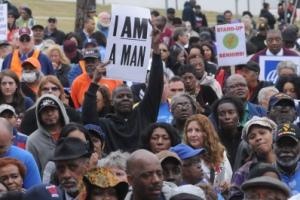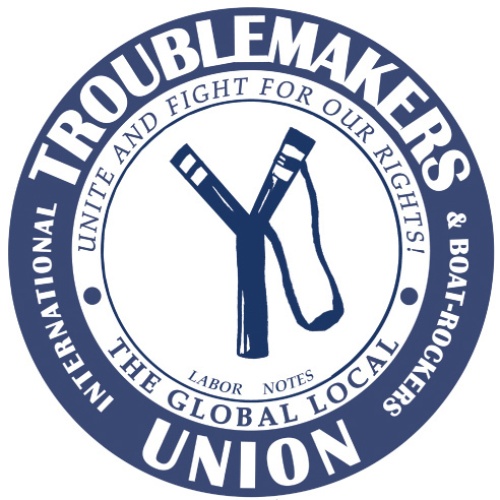VOICES: Union rights should be civil rights

By Rick Kahlenberg and Moshe Marvit, Labor Notes
After 60 years of labor law heavily tilted toward employers, it's time to rebalance the scales by making labor organizing a civil right. Rand Wilson's proposal for state "just cause" laws is one approach to reforming the law, but we also need federal legislation and a campaign that can gain allies outside of unions.
Our proposal takes the conversation about labor law reform out of the technical and often confusing arena of labor law and into the realm of civil rights. The notion of civil rights has a moral grounding that resonates with a far greater number of Americans than just those in unions.
A proposal for labor law reform must be simple and show promise of surviving intact after a sustained attack by conservative and corporate interests.
A civil rights framework holds that promise because it does not pit corporations against unions -- a fight that is too often mischaracterized as one between two special interests. A civil rights approach focuses on the individual and her basic right to be treated as a human being in the workplace.
Unlike our experience with the failed Employee Free Choice Act, a debate under these terms is more difficult for labor's enemies to mischaracterize. Their opening salvos indicate they have a hard time crafting a coherent counter-argument. So far they have responded that civil rights are only for black people, that the true affront to civil rights is the Davis-Bacon prevailing wage act, and that the actual civil right is not to join a union!
Law on Your Side
The legislation we propose could be either an amendment to the Civil Rights Act or stand-alone legislation that parallels it, similar to the Age Discrimination in Employment Act. Either approach would give workers powerful benefits and remedies that would dissuade employers from infringing on workers' right to organize, while also making whole those workers who suffer discrimination because of their organizing.
As we outline in our new book, Why Labor Organizing Should Be A Civil Right, workers who suffer discrimination for labor activity would be allowed to move their cases from the National Labor Relations Board to federal court. This is similar to the existing right of workers who suffer job discrimination on gender, race, age, and other grounds to remove their cases from the Equal Employment Opportunity Commission (EEOC) to federal court.
The time an employee would have to park her case at the NLRB would likely be short -- perhaps just 30 days -- because in the context of a union organizing drive and election, the six months that the EEOC makes workers wait would be far too long.
It's right to be skeptical of entrusting the federal judiciary, which has a long history of animosity towards labor. But few federal civil cases ever make it to a judge or jury. Most are settled without a trial -- and the settlement process is a forum for workers to make demands.
Individual Aids Collective
Some may see this proposal as a departure from the traditional labor framework because it shifts the focus from collective rights to individual rights. We do recast union organizing as an individual civil right linked to the First Amendment -- which fits better politically into America's reigning ethos of individualism. But this focus can actually enhance labor's collective goals.
During an organizing drive employers prey on the disproportionately weak position of the individual worker. Rarely do they discipline or fire every worker, but rather pick off a few -- often the most visible organizers -- for discriminatory treatment.
This tactic is intended to scare the remaining employees while asserting the employer's power, and too often it succeeds. Civil rights legislation would empower individual employees in their pursuit of collective action precisely when they are most vulnerable. The power of each individual worker aggregates to produce collective power.
Furthermore, this legislation would give workers a chance to disrupt the employer's operations.
The right to pretrial discovery, which is part of any federal case, may sound like a technical matter, but anyone who's participated in litigation knows that it can put quite a burden on employers.
Supervisors and managers can be forced to leave work and answer questions under oath concerning treatment of workers and internal company communications. Records and emails, financial documents, and communications with anti-labor consultants can all be demanded for review, revealing an unadulterated view of the company.
Not only will this information be useful for organizing, but the process will be highly disruptive to the business.
Hit the Pocketbook
The proposal would also provide real remedies for aggrieved workers and change the calculus for employers considering violating workers' rights.
Under the National Labor Relations Act, an employer can violate the law with relative impunity, aside from its own legal fees. When an employer is found to violate workers' rights, the most it has to do is offer reinstatement, post a notice promising not to violate the law again, and pay back-pay.
Under the Civil Rights Act, however, victorious employees will be awarded back pay and compensatory damages, which include pain and suffering, and other real damages that result from loss of a job. Additionally, the law provides for attorneys' fees and for the possibility of punitive damages, which can be as high as $300,000 per employee. Such penalties will make employers think twice before violating workers' rights.
Employers would also have an incentive to sign a first contract, through a provision that would give safe haven from punitive damages if the employer either signs a collective bargaining agreement or submits to binding arbitration.
After the slow death of the Employee Free Choice Act in the first years of President Obama's administration, the prospects for labor law reform may seem laughably remote. All the more reason to rethink our strategy now, before the next opportunity.
Richard D. Kahlenberg, a senior fellow at The Century Foundation, and Moshe Z. Marvit, an employment discrimination and labor attorney, are co-authors of Why Labor Organizing Should Be a Civil Right. Photo by David Bundy, SEIU, via Labor Notes.
Tags
Labor Notes
Labor Notes is a media and organizing project that has been the voice of union activists since 1979.
